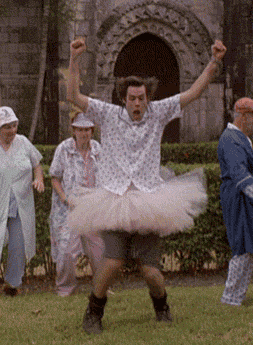Since I am trying to add a bit of exercise to my
cheese-eating day, I have found Zumba to be a pleasant alternative to running
on the treadmill with the aircon aiming right at the back of my neck. Zumba is
great. I mean, I almost always look silly doing it, I almost always sound like
a broken boiler and almost always sweat as if that previously rejected aircon
would suddenly be godsend. I rarely mind the silliness, as a quick look around
will remind me that it is not just me and everyone looks like a clumsy kangaroo trapped in an human's body. Everyone is clapping along and sometimes shouts a
few war cries just to get in the mood. It’s fun and it resembles dancing,
especially when the instructors assume you know how to Samba. Guys, we don’t know how
to Samba.
Zumba is so successful that there are songs that were
written specifically for that purpose. And you can tell because the word
‘Zumba’ is heavily featured as well as numerous motivational phrases such ‘Put
your hands up, burning with desire, shake that bum bum, and light that fire’. I
particularly appreciate the pretence that it is not a song about Zumba by
throwing the word ‘desire’ into the mix. I even have a theory that some genuine
pop songs were written with Zumba in mind; they are a very good fit for Zumba
and a very bad fit for anything else. I have accepted the playlists and the
basic moves that get recycled and re-arranged into a choreography. But have you
heard of psychedelic Zumba?
It is not an actual term, but it should be so people would
know to avoid it. It is essentially what you get when you combine Zumba with an
instructor who forgot to take drugs, but remembers what if feels like. One of
the instructors we had over the summer, while our regular instructor was on
holiday, definitely fits into this category. I should have known the moment she
introduced herself. First of all, she was overly friendly and smiley; clear
signs of MDMA. Secondly, she spoke of a two-day Zumba festival somewhere remote
in London. There is nowhere remote in London. Also, there is no two-day Zumba
festival. Or if there is, there shouldn’t be. But her friendliness and
positivity initially confused me and I stayed for the class. The Zumba songs
were worse than usual. They usually have a Latin, maybe light RnB feel to them; these once were straight psychedelic or rave or the kind of music that hurts in
a very specific spot in the middle of your forehead. And in case some fans of
this cacophony begin to think this is starting to sound good, let me point out
that the silly Zumba lyrics are still very much present and they have somehow gotten sillier. I am talking ‘Zumba,
Zumba, zu-zu-zu-zu-zu-zumba’. The instructor had clearly hand-picked the music,
as she had closed her eyes and sort of moved with the flow. There was no pattern
for us to follow, most of us stood still and maybe occasionally put a hand up
when we briefly thought we grasped a choreography out of her, but she wouldn’t
have known because, as I said, she had her eyes closed and was in a completely
different dimension. Three people left during that class, and that is three out of eight.
And I swear she never saw them leave and maybe didn’t even realise they were
gone when the class ended. I, however, having stayed in England for longer than I
should have, decided it was better to waste an attempt for a healthy
lifestyle, rather than be impolite and go do a bit of running.
But, coming back from my holiday in Greece, I acquired a
better mindset. Because believe it or not, the instructor who lost 37% of her
class was permanently hired. And believe it or not I walked into her class once
again. And this time there were only three of us. Well, two after I took off.
I am not proud. I tried to be nice about it and fake an
ankle injury, but again, she had her eyes closed forever! So I just took off.
And if this sounds like I felt guilty after, or I still do, or I am writing
this blog hoping someone will tell me what I did wasn’t horrible and in no way
will lead to her being fired, I am not. But, you know, I won’t complain if that sort of reassurance comes up J



